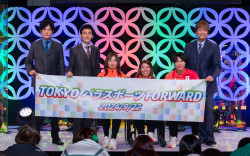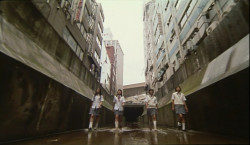
October 19, 2011
Tokyo International Film Festival
Tokyo’s biggest film festival pushes forward
By Metropolis
Originally published on metropolis.co.jp on October 2011

Started in 1985, The Tokyo International Film Festival (TIFF) will put on its 24th edition (the fest was held every other year until 1989) from Oct 22-30. TIFF has always been a great opportunity to see non-English language films with English subtitles, but the quality of the work has been variable over the years. This year however, things seem to be trending toward a stronger overall line-up, buoyed by enhanced relationships with filmmakers across Asia—and the world. Sadly, the event still has issues with securing English-subtitled prints, so check the flicks you want to see carefully, as some (a minority) may not have English captions.
Any prize-giving film fest starts with a competition section and TIFF’s has made some serious strides since Yoshi Yatabe took over as programmer. The only requirements for this division are that entries be 2011 productions and Asian premieres. This year’s competition has, perhaps, more prestigious names than any time in the past. Says Yatabe, “I’ve been in this position five years so my relationships around the world have become more solid.” He also aims for a good mix of movies:
“I try to get both films by famous directors and debut films by new artists. This way the competition can be as varied as possible.”
Among the high-profile filmmakers, Rodrigo Garcia (Things You Can Tell Just by Looking at Her) offers Albert Nobbs; director Michael Winterbottom (24 Hour Party People) submits Trishna; Tony Kaye (American History X) unspools Detachment; and Oxide Pang (Bangkok Dangerous) rolls out Sleepwalker. Also worth making an effort to see is Francesco Patierno’s biting Italian satire Things from Another World. All non-English language entries in this section will have English subtitles.
The Winds of Asia section usually presents an interesting selection of work from this side of the globe. Check out famed Cambodian director Rithy Panh’s re-imaging of Nagisa Oshima’s classic The Catch. Oshima’s influential original (1961) will also play in this section. Tatsumi by Singaporean auteur Eric Khoo is an animated feature that depicts the life and work of manga artist Yoshihiro Tatsumi.
Generally reserved for big budget pics that will screen in Tokyo anyway, ten of the 24 flicks in the Special Screenings section this year are Japanese, so if you want to check out—with English subtitles—what the studios here think are their strongest efforts, look for these.
Unfortunately, German auteur Wim Wenders’ hidden gem—a 3D homage to legendary contemporary dancer Pina Bausch, filmed in nine languages and titled simply Pina— will be shown sans English titles. Even worse, Werner Herzog’s documentary Cave of Forgotten Dreams is dubbed into Japanese.
Lastly, the Japan Eyes section purports to offer the best of Japanese indie cinema. While the claim may be questionable, it is still a great chance to see some smaller J-films, with those helpful English captions.







